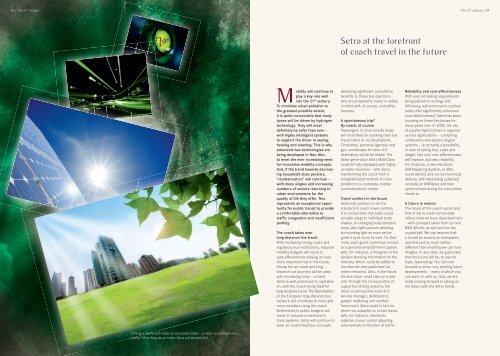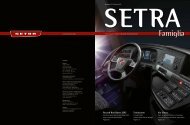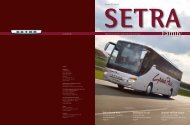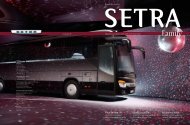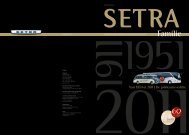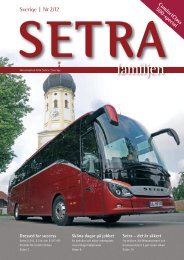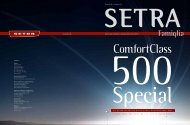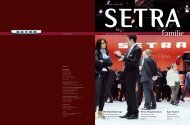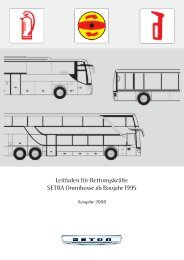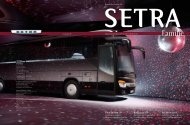Family - Setra
Family - Setra
Family - Setra
Create successful ePaper yourself
Turn your PDF publications into a flip-book with our unique Google optimized e-Paper software.
38 | The 21 st century The 21 st century | 39<br />
<strong>Setra</strong> at the forefront<br />
of coach travel in the future<br />
M<br />
obility will continue to<br />
play a key role well<br />
into the 21 st century.<br />
To minimise urban pollution to<br />
the greatest possible extent,<br />
it is quite conceivable that many<br />
buses will be driven by hydrogen<br />
technology. They will most<br />
definitely be safer than ever –<br />
with highly intelligent systems<br />
to support the driver in seeing,<br />
hearing and steering. This is why<br />
advanced new technologies are<br />
being developed in Neu-Ulm,<br />
to meet the ever increasing need<br />
for innovative mobility concepts.<br />
And, if the trend towards decreasing<br />
household sizes persists,<br />
“reurbanisation” will continue –<br />
with many singles and increasing<br />
numbers of seniors returning to<br />
urban environments for the<br />
quality of life they offer. This<br />
represents an exceptional opportunity<br />
for public transit to provide<br />
a comfortable alternative to<br />
traffic congestion and insufficient<br />
parking.<br />
The coach takes over<br />
long-distance line travel<br />
With increasing energy costs and<br />
regulatory eco-restrictions, reduced<br />
mobility budgets will result in<br />
cost-effectiveness playing an even<br />
more important role in the future.<br />
Cheap line air travel and longdistance<br />
car journeys will be used<br />
with increasing rarity – a trend<br />
<strong>Setra</strong> is well positioned to capitalise<br />
on, with the coach being ideal for<br />
long-distance travel. The liberalisation<br />
of the European long-distance bus<br />
network will contribute to more and<br />
more travellers using the coach.<br />
Bottlenecks in public budgets will<br />
result in reduced investment in<br />
track systems. <strong>Setra</strong> will continue to<br />
work on customised bus concepts<br />
delivering significant competitive<br />
benefits to those bus operators<br />
who are prepared to invest in safety,<br />
comfort and, of course, cost-effectiveness.<br />
A spontaneous trip?<br />
By coach, of course<br />
Passengers in more remote areas<br />
will most likely be booking their bus<br />
travel online or via Smartphone.<br />
Timetables, personal agendas and<br />
geo-coordinates for take-off/<br />
destination will all be linked. The<br />
latest-generation <strong>Setra</strong> MultiClass<br />
could be fully equipped with highly<br />
versatile receivers – with <strong>Setra</strong><br />
transforming the coach from a<br />
straightforward method of transportation<br />
to a complete, mobile<br />
communications centre.<br />
Travel comfort in the future<br />
<strong>Setra</strong> will continue to set the<br />
standard in coach travel comfort.<br />
It is conceivable that seats could<br />
actually adapt to individual body<br />
shapes, to changing body temperatures,<br />
with light sensors dimming<br />
surrounding light as soon as the<br />
guest’s eyes close for rest. Furthermore,<br />
each guest could have access<br />
to a personal entertainment system<br />
with, for instance, a hologram in the<br />
window showing information on the<br />
itinerary, which could be added to<br />
touchscreen and publicised via<br />
online networks. Also, in the future,<br />
the bus driver could take on a new<br />
role: through the incorporation of<br />
supportive driving systems, the<br />
driver could become more of a<br />
service manager, dedicated to<br />
guests’ wellbeing and comfort.<br />
Tomorrow’s <strong>Setra</strong> could in fact be<br />
driven via autopilot on virtual tracks<br />
with, for instance, electronic<br />
adaptive cruise control adjusting<br />
automatically to the flow of traffic.<br />
Reliability and cost-effectiveness<br />
With ever increasing requirements<br />
being placed on ecology and<br />
efficiency, will tomorrow’s coaches<br />
really offer significantly enhanced<br />
cost-effectiveness? <strong>Setra</strong> has been<br />
focusing on these key issues for<br />
many years now. In 2020, the use<br />
of parallel hybrid drives in regionalservice<br />
applications – combining<br />
combustion and electric engine<br />
systems – is certainly a possibility,<br />
in view of saving fuel, costs and<br />
weight. Not only cost-effectiveness<br />
will improve, but also reliability.<br />
For instance, a new electronic<br />
Self-Repairing System, or SRS,<br />
could identify and correct technical<br />
defects, with data being collected<br />
centrally at OMNIplus and then<br />
synchronised during the next online<br />
check-in.<br />
A future in motion<br />
The future of the coach sector and<br />
that of <strong>Setra</strong> could conceivably<br />
reflect what we have described here<br />
– with concepts taken from current<br />
R&D efforts, as well as from the<br />
crystal ball. We can assume that<br />
a lot will be exactly as anticipated,<br />
and that just as much will be<br />
different than anything we can now<br />
imagine. In any case, we guarantee<br />
that the future will be, to say the<br />
least, fascinating! You can look<br />
forward to some very exciting future<br />
developments – many of which you<br />
can work on with us. And, we are<br />
really looking forward to taking on<br />
the future with the <strong>Setra</strong> family.<br />
Driving a future with clean air and green cities – a vision or, perhaps soon,<br />
reality? One thing we do know: <strong>Setra</strong> will be part of it.


